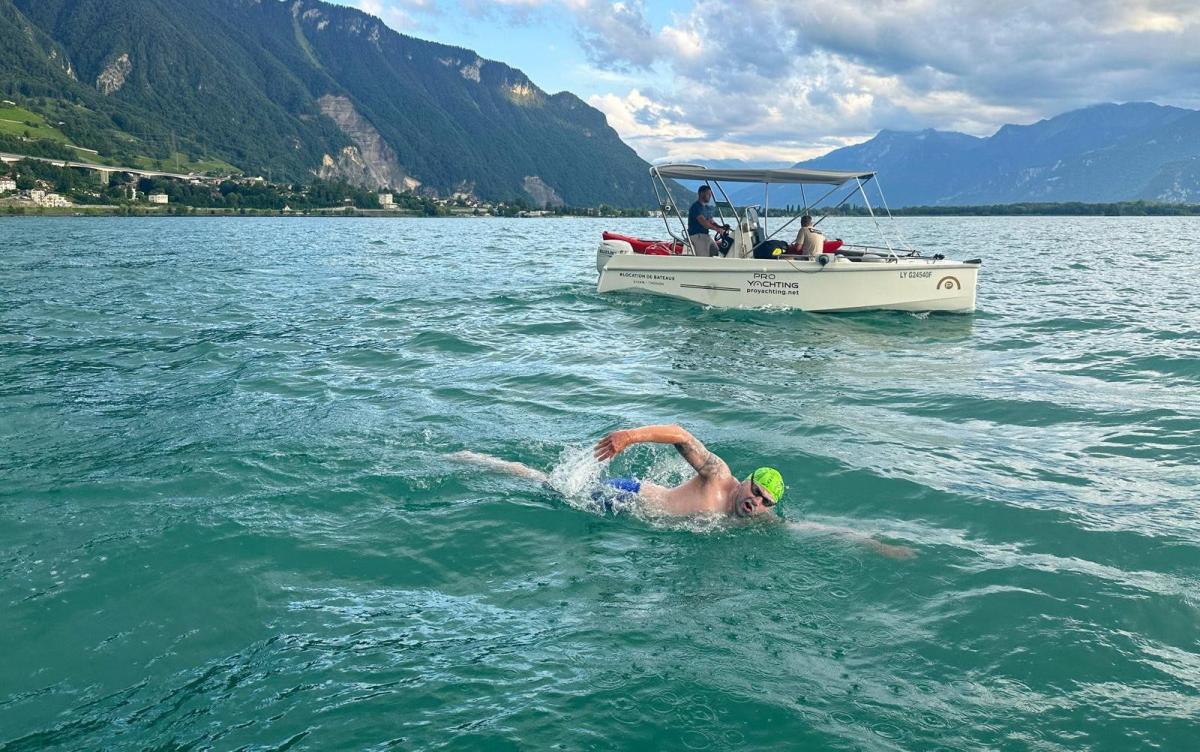Sports
British man breaks 38-year record swimming across Lake Geneva in 22 hours – fuelled on doughnuts

A dad from North Devon has broken a 38-year-old record after swimming the entire length of Lake Geneva fuelled by doughnuts.
Neil Gilson defied choppy waters and floating logs – as well as the risk of hypothermia – to complete the mammoth swim in 22 hours and nine minutes, fulfilling a long-time ambition.
Despite navigating strong currents, he shaved 33 minutes off the long-standing record set by Swiss Olympian Alain Charmey in 1986.
A former competitive swimmer who represented Great Britain at national level in his twenties, Gilson attempted the swim last year but had to be pulled from the water at the 56-kilometre mark after developing hypothermia.
But the determined 38-year-old vowed not to give up on his challenge and after lathering himself in water resistant sun cream, set off on his swim at 7.45pm local time last Tuesday.


Incredibly, his training swims – which he split between his local pool and the sea close to his home in Berrynarbor near Ilfracombe – rarely exceeded four kilometres. But he etched his name into the history books using an unorthodox fuelling regime that started off with energy gels.
“I couldn’t stomach them so I started listening to my body and eating doughnuts,” said Gilson, who finished the swim at 5.34pm on Wednesday. “I smashed through about five throughout the swim, along with some bananas.
“I swam through the night so I could get that out the way first. It was very choppy and I swallowed a lot of water. There were lots of logs from trees and debris that I had to dodge but I did get hit on the head a few times.
“It’s because of the currents in the lake – sometimes they can work with you and other times they can work against you – but it flattened right out going into night, so it worked out quite well after that.”


Gilson was accompanied by the Lake Geneva Swimming Association, which piloted his swim and ensured he was never in danger.
Remarkably, only 12 people have completed the swim across the lake, the same number of people who have walked on the moon. “The length and having to swim through the night puts people off,” explained Gilson. “You’re not allowed to touch another vessel or another person and you have to aid your feeds by yourself.”
The hotel director feared hypothermia would strike again some six hours into the swim when the air temperature began to drop which forced him to dig deep.
“Although I had done some extra-cold water training for it this time round, I kept having flashbacks through the night,” he said. “I got cold at one point and feared the worst, but I managed to speed up enough to warm up again.
“It would have been about 2am when it was really tough. There were all sorts of other mental challenges. After I made it through the night, I still had two thirds of the swim to go.
“I thought the record was on when I reached half way, but I hit a bit of a wall and one of the members from the boat suggested I pick it up a bit. So it was a case of swimming through the pain barrier. I was quite confident going into it because of doing half of it last year, but the end was tough.”


Gilson’s record will be submitted to the Marathon Swimmers Federation in order to be formally ratified.
He completed the swim to raise money for the PANS PANDAS UK, a charity which educates GPs, teachers and families about the neuropsychiatric conditions Paediatric Acute-onset Neuropsychiatric Syndrome and Paediatric Autoimmune Neuropsychiatric Disorders Associated with Streptococcal Infections.
The autoimmune condition causes inflammation on the brain and can trigger strange behavioural changes in children, impacting their social skills and general body functions.
Gilson’s son Jack was diagnosed with the disorder aged two after contracting bacterial tonsillitis nine times in the same year. He ended up developing a tic and struggled to leave the house. “He’s completely fine now. He has moments when he has flares, but it’s a condition that is often diagnosed as autism,” said Gilson.
Gilson, who in 2021 swam the Bristol Channel from Swansea to Ilfracombe in just 11 hours and 47 minutes, intends to take some time off before planning his next adventure.
“Usually I’ll have a big comedown after a big swim,” he said. “When you’re doing it, all you can think about is finishing and not doing it again.
“But this has happened in the past after I’ve done big swims, I have a few months off and then I’ll get the itch again. There’s a couple of other lakes I’d like to do, Lake Como in Italy being one of them. But for now I’m putting my feet up.”




